© 2014-

BEFORE RNI
In late 1967 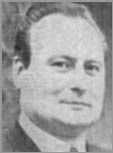 two Swiss advertising entrepreneurs Norbert Gschwendt and Emil Lüthi (who owned an advertising agency -
two Swiss advertising entrepreneurs Norbert Gschwendt and Emil Lüthi (who owned an advertising agency -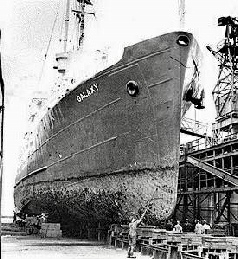 ch had docked in Hamburg on 21st August 1967, following the station’s closure on 14th August. Shortly afterwards the vessel had been sold to a Greek ship owner.
ch had docked in Hamburg on 21st August 1967, following the station’s closure on 14th August. Shortly afterwards the vessel had been sold to a Greek ship owner.
Their plan, first announced on 17th April 1968, was to broadcast German-
Six German-
It was reported that "Radio Nordsee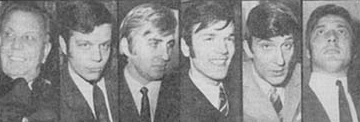 " planned to start broadcasting for 20 hours a day on a wavelength of 266 metres from an anchorage off Helgoland on 1st November 1968. However, this date passed, as did other advertised dates of .1st December 1968, 12th December 1968 and May 1969.
" planned to start broadcasting for 20 hours a day on a wavelength of 266 metres from an anchorage off Helgoland on 1st November 1968. However, this date passed, as did other advertised dates of .1st December 1968, 12th December 1968 and May 1969.
Also during this period the (West) German government had been in the process of passing new legislation, similar to the British Marine Broadcasting (Offences) Act, to outlaw offshore radio stations.
The threat of this new legislation, together with the fact that when the project’s ship, MV Galaxy, had been dry docked in Hamburg it was discovered that parts of her hull were very thin so she was unable to obtain a sea worthiness certificate, meant that almost from the outset the Radio Nordsee project was doomed to failure.
A serious blow to the project came on 25th January 1969 when, with government legislation about to be introduced and the news about the non-
In an attempt to keep the Radio Nordsee Project alive immediately after the departure of his partner the other financier, Norbert Gschwendt, organised a champagne party and hired a number of small planes to allow news reporters to fly over the proposed radio ship which was still docked in Hamburg.
The new legislation from the (West) German government, which had been ratified in 1968, finally became law on 2nd July 1969 and shortly afterwards the second financial backer, Norbert Gschwendt also withdrew his support. Plans to launch the first German language offshore station from the MV Galaxy were finally abandoned.
However, two Swiss radio engineers, Erwin Meister and Edwin Bollier, who had been engaged by the Gloria/Nordsee Project, to maintain the technical facilities on board the Galaxy decided that the idea of launching a new offshore radio station was indeed a viable proposition, so they planned to establish a station of their own and broadcast programmes in English and German from an anchorage in the North Sea.
They found and purchased a ship -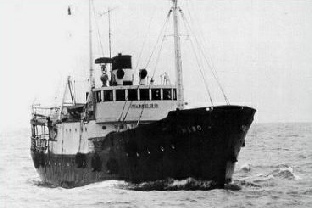 ipyard in Trondheim, Norway .. The ship, which was renamed MV Mebo, sailed to the van De Groot and Vliet shipyard in Slikkerveer, Rotterdam, The Netherlands. and work started on converting her into a broadcasting station.
ipyard in Trondheim, Norway .. The ship, which was renamed MV Mebo, sailed to the van De Groot and Vliet shipyard in Slikkerveer, Rotterdam, The Netherlands. and work started on converting her into a broadcasting station.
However, it soon became apparent that the ship was too small, so another, much larger, vessel was purchased -
The MV Mebo was then renamed Mebo I and relegated to the role of station tender. Meanwhile the Silvretta had been renamed Mebo II and in September 1969, a start was made with the conversion of the ship to house the planned new offshore radio station.
All work on converting the new radio ship was carried out at the Groot an d Vliet shipyard in Slikkerveer, Rotterdam and Mebo II was to become the most luxurious and best equipped offshore radio ship ever.
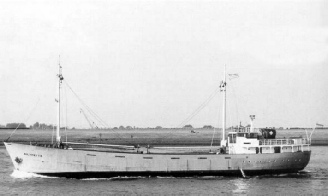
FOOTNOTE
The mast which had been purchased for installation on the Bjarkoy was subsequently given to Abie Nathan:who at the time was planning his own project for an offshore radio station anchored off Israel -
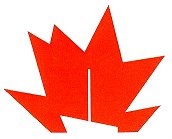
Do you have any other memorabilia about RNI which we could add to this Special Exhibition?
If you do, and you are willing to allow the Museum to use it, please contact
We look forward to hearing from you
Norbert Gschwendt
MV Galaxy dry docked in Hamburg, 1968
‘Radio Nordsee’ DJs pictured in the Galaxy studio
Photo: Hans Knot/Soundscapes
‘The first ship planned to house RNI -
Photo: Hans Knot/Soundscapes
‘The second ship planned to house RNI -
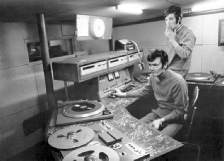
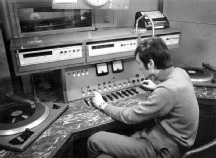
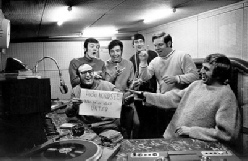
Left to Right: Captain William Buninga (Captain of the MV Galaxy during her Radio London days and whilst she was docked in Hamburg with five of the Radio Nordsee DJs -
Photo: Hans Knot/Soundscapes
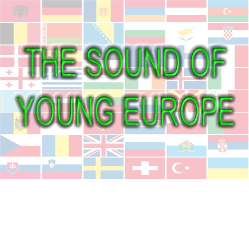


EXHIBITION INDEX
Before RNI



Ground
Back to






Back to
Index



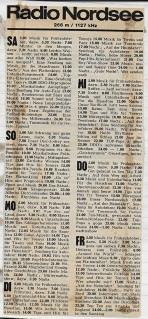
Radio Nordsee planned programme schedule.
Courtesy Hans Knot
Click image to enlarge
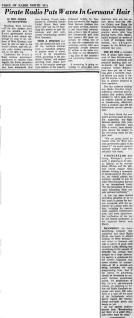
Indianapolis Star
14th December 1968
Click image to enlarge